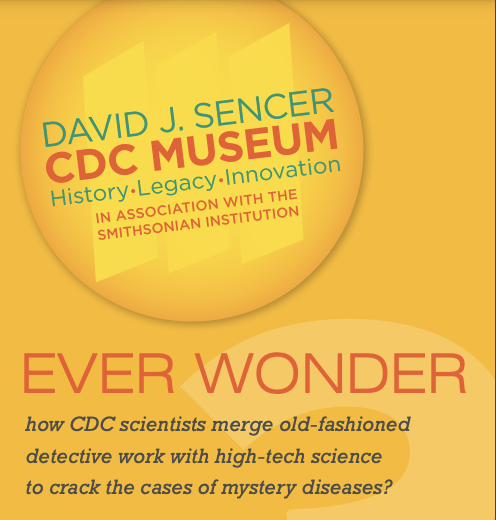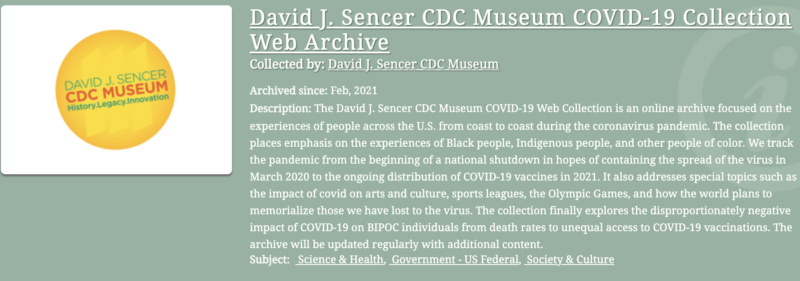Archiving the Pandemic @ the CDC Museum
21 October 2021 – Maya Brooks

Screenshot courtesy of David J. Sencer CDC Museum
In March 2020, working from home, curators and archivists from the David J. Sencer CDC Museum began to plan for how best to collect the tsunami of pandemic content being generated amid the emerging COVID-19 public health crisis. A collection solely focused on CDC internal responses would be inadequate to show the breadth of the pandemic. With this in mind, the CDC Museum archivists and curators engineered a plan to capture relevant community content that showcases CDC internal processes in addition to demonstrating how CDC guidelines and decisions played out in communities once they left the walls of the agency. But with the museum closed because of the pandemic, how would we share this content with the public?
One solution we were introduced to was the web-based archive service called Archive-It. The service utilizes open-source, crawling technologies to capture websites exactly as they are on the day the content is first posted. We decided that this would be the best way to share our digital content and capture content the museum has never collected before: websites. It also gave us the opportunity to collect even more digital content than anticipated at the beginning of the project. Thus, we decided to track the pandemic from the very start on a variety of websites. We formed a COVID-19 web collecting team featuring myself (Maya Brooks, assistant archivist), Heather Rodriguez, assistant curator, and Mary Hilpertshauser, collections manager. (We are each contractors with Chickasaw Management Services, LLC). The three of us attended trainings on how to use Archive-It and discussed which websites we wanted to collect.

Screenshot from Archive-It showing the scope of the David J. Sencer CDC Museum’s collection efforts
Our first priority was to collect articles from major newspapers across the country that could provide a representative sample of COVID-19 news across the different regions of the United States. We believed that, in addition to gathering CDC material that shows the public health response in these areas, the papers would give us a window into insights about how the COVID-19 pandemic had progressed in these regions.
To begin, we selected the Houston Chronicle, The San Francisco Chronicle, the Chicago Sun-Times, the Miami Herald, the Seattle Times, and the New Orleans Advocate. We wanted perspectives from different parts of the country so as to reflect each region’s unique problems and populations. Then, we delved into special topics such as the creation of COVID-19 memorials, the pandemic’s impact on the Tokyo 2021 Olympics, LGBTQ+ people, sports leagues, arts and culture, and the rise in Asian hate crimes due to COVID-19. We also collected around the vaccine rollout and the Biden administration’s federal COVID-19 response. The pandemic has impacted all aspects of our lives, and we hope to continue collecting around as many topics as we can with the provided storage space.
This pandemic has brought to light the many disparities that exist in America, from lack of healthcare to housing to lack of food to unequal access to education. That makes this collection effort all the more important and timely. It is crucial that we document these disparities in order to work effectively for change. Our Archive-It site is currently live and available for the public to view. We also have plans to create physical COVID-19 exhibits using our collection of objects, graphics, photographs, media, and digital content. But the digital effort described here has the potential for an even wider reach. It is a resource for future historians studying this pandemic and for all of us as we collectively reexamine our experiences throughout the pandemic to reflect on lessons learned.
~Maya Brooks is the former assistant museum archivist at the David J. Sencer CDC Museum and current Ph.D. student in history at the University of Georgia.
For questions about the Collection or the Museum, please contact Heather E. Rodriguez, Assistant Curator. David J. Sencer CDC Museum: [email protected]



